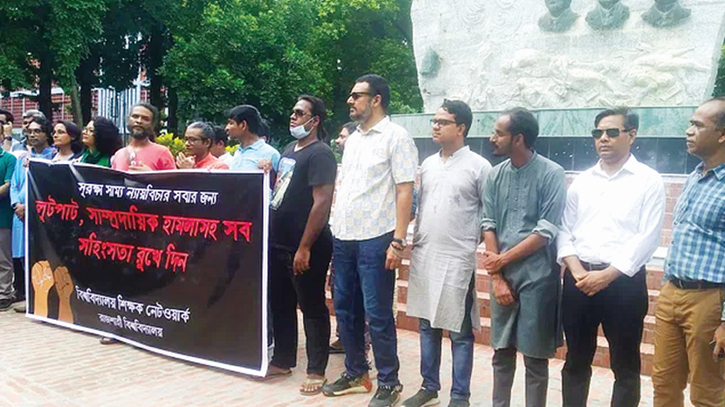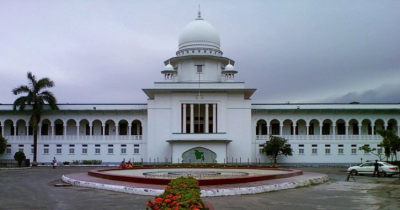
Calling for collective action to prevent incidents like violence, looting, and communal attacks occurring across the country, they organized a procession and rally on Tuesday afternoon. Photo: Messenger
Following Sheikh Hasina's resignation as Prime Minister, protests have erupted nationwide against the violence, looting, and communal attacks occurring across the country. Rajshahi University teachers have expressed their condemnation of these acts. Calling for collective action to prevent such incidents, they organized a procession and rally on Tuesday afternoon.
The event, organized by the Rajshahi University Teachers' Network, saw participation from students, filmmakers, and environmental activists. The teachers began their procession on campus at 12 PM, starting from the Shaheed Buddhijibi Memorial and circled the campus, culminating in a brief rally at the same location.
Moderated by Associate Professor Kazi Mamun Haider from the Department of Mass Communication and Journalism, the rally featured speeches from Professor A-Al Mamun of the same department, Professor Syed Mohammad Ali Reza from the Management Department, Professor Farid Uddin Khan from the Economics Department, and Professor Susmita Chakraborty from the Folklore Department, among others.
Professor A-Al Mamun stated that the students and the public have stood up and fought against a dangerous fascist force in novel ways. Historical uprisings and movements, such as the 1969 mass uprising and the 1970 elections, have often been misappropriated, with students and the public's aspirations repeatedly undermined. He cited examples like the anti-Ershad movement in 1990 but noted that this time, people from all classes, regardless of religion or caste, are standing with the students and the public. He emphasized the need to listen to the students and address their concerns. He warned that the fall of fascism is always accompanied by significant destruction and noise, criticizing the current regime's disrespect towards everyone and predicting a harsh backlash. He stressed the necessity of building a new Bangladesh, noting that students and the public had already thwarted communal attacks the previous night.
Professor Susmita Chakraborty pointed out that students and the public are actively resisting communal attacks during this time. They are standing guard in neighborhoods, and the younger generation is rising against these issues. She hoped this would become the image of Bangladesh, advocating for continuous protest everywhere. She also criticized the influence of partisan politics within the campus, which prevents teachers from becoming strong educators, and called for action against partisan subservience in educational institutions. She believed that confronting these issues could elevate the academic and cultural standards of educational institutions.
Professor Syed Mohammad Ali from the Management Department highlighted that the leaders of this revolution are students involved in the anti-discrimination movement. These young people understood that without reforming central and state systems, nothing would improve. He viewed this uprising as a movement for reform and urged immediate decisions on whether to trample on the dreams of these youths or to advance the country following their vision. He emphasized that this revolution is driven by students and the public and must address the violence and communal attacks that have occurred to ensure the rule of law.
Professor Farid Uddin Khan noted his satisfaction in joining the path of light and liberation shown by the students and the public, bringing a new freedom to the country. However, he expressed disappointment over the looting and communal attacks being carried out by some amidst the excitement. He clarified that this movement is not for destruction, conflict, or looting, but to build a non-communal Bangladesh for everyone.
Messenger/Fameema








